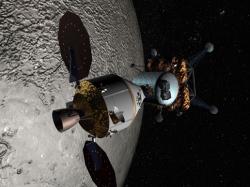Written by Fraser Cain

There are many ways space exploration can affect our environment right here on Earth: toxic chemicals used to manufacture the rocket, carbon dioxide pumped into the atmosphere and the energy used to manufacture the equipment and vehicles, just to name a few. For the next era in space exploration, the Constellation Program, NASA has released a 500-page document detailing its effect on the environment.
Back in September 2006, NASA solicited feedback from the public about their plans for the Constellation Program. They were looking for environmental issues and concerns that the people might have. The agency released a draft of their reply to these concerns in August 2007.
The document released Wednesday, is called the Final Constellation Programmatic Environmental Statement (PEIS), and it addresses the comments made to the draft version of the document.
The document explores each NASA centre across the United States, what parts of the Constellation Program it will work on, and the environmental impact the centre might have. This part of the document is fascinating to show how the whole program will come together - where each part will be built.
• Risks to the public associated with launch and Earth atmospheric entry
• Environmental impacts of the use of solid rocket fuels on the ozone layer and impacts associated with the deposition of combustion products near the launch area
• Impacts on local animal species (e.g., sea turtles and manatees) associated with construction and launch activities in the John F. Kennedy Space Center (KSC) area
• Noise impacts associated with launch events
• The relationship between the Constellation Program and the Space Shuttle Program, including how the socioeconomic impacts of the Space Shuttle retirement and the Constellation Program overlap.
Perhaps more interesting than the things they considered where the issues that the document won't consider. For example, the document expressly refuses to study the environmental impact on outer space itself, such as orbital debris. It also doesn't consider any military aspects associated with the program and the environmental impact of that. (If the Constellation Program helps launch orbital space lasers, and they're used to zap sea turtle habitats, that's not NASA's problem.)
Although they put in their questions, several submitters won't get an answer. For example, the document won't address how the Kennedy Space Center could manage its light pollution, monitor bird strikes, or raise awareness of metals in the environment. And the environmental impact on the Moon is right out of the question.
Anyway, if you're interested in this topic… and who wouldn't be, you can access the whole document online.
Original Source: NASA



No comments:
Post a Comment